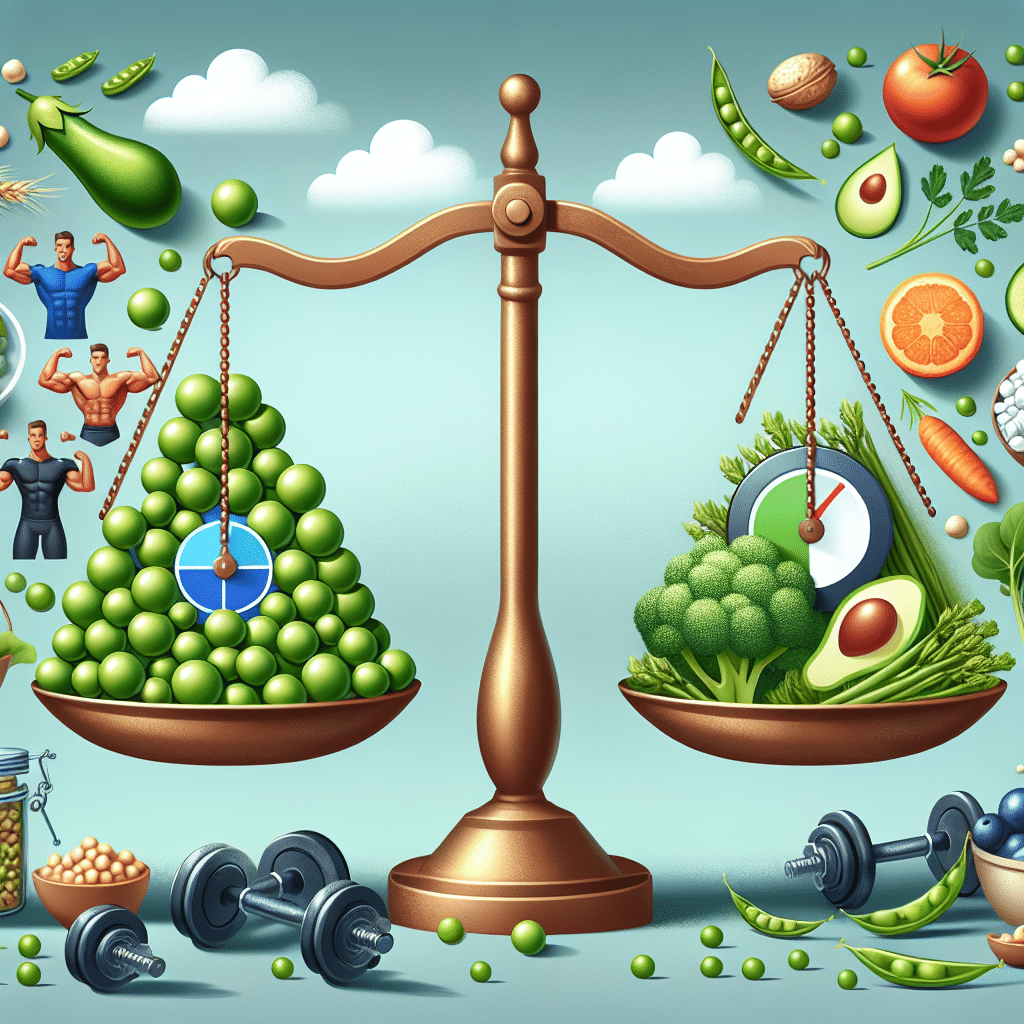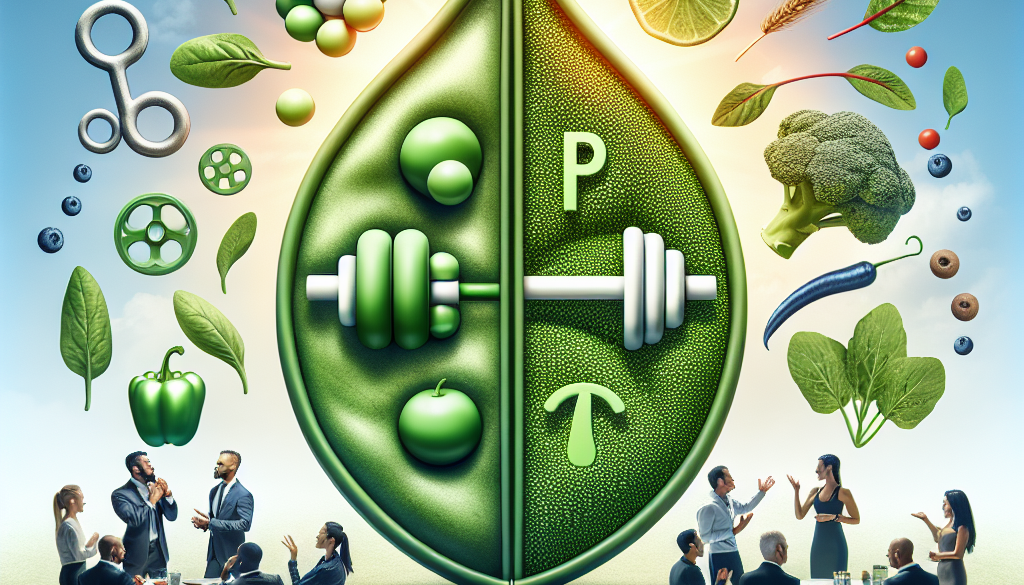Is Peas Protein or Vegetable: Nutritional Debate
-
Table of Contents
Is Peas Protein or Vegetable: Nutritional Debate

Peas are a versatile and nutritious food that has been consumed for centuries. They are commonly classified as a vegetable due to their culinary uses and appearance, but there is an ongoing debate about whether peas should be considered a vegetable or a protein source. In this article, we will explore the nutritional aspects of peas and delve into the arguments on both sides of the debate.
The Nutritional Profile of Peas
Peas are packed with essential nutrients that contribute to a healthy diet. They are a good source of vitamins A, C, and K, as well as folate and fiber. Peas also contain minerals such as iron, magnesium, and potassium. Additionally, peas are low in fat and calories, making them an excellent choice for weight management.
One of the key nutritional components of peas is their protein content. Peas are considered a high-quality plant-based protein source, as they contain all nine essential amino acids that the body needs for optimal functioning. This makes peas a valuable option for individuals following vegetarian or vegan diets, as well as those looking to reduce their consumption of animal products.
Peas as a Vegetable
Traditionally, peas have been classified as a vegetable due to their culinary uses. They are commonly used in savory dishes, salads, and soups, and are often considered a staple in many cuisines around the world. Peas are also included in the vegetable group in dietary guidelines and food pyramids.
From a botanical perspective, peas are the seeds of the Pisum sativum plant, which is a member of the legume family. Legumes are typically classified as vegetables due to their plant-based nature and nutrient content. Therefore, it is logical to consider peas as a vegetable based on their botanical classification.
Peas as a Protein Source
On the other hand, peas are increasingly being recognized as a valuable protein source. Pea protein has gained popularity in recent years as a plant-based alternative to animal-based proteins. It is commonly used in protein powders, protein bars, and other nutritional supplements.
Pea protein is highly regarded for its nutritional profile. It is easily digestible, hypoallergenic, and contains a balanced amino acid profile. Pea protein is also rich in branched-chain amino acids (BCAAs), which are essential for muscle growth and repair. These qualities make pea protein a popular choice among athletes, bodybuilders, and individuals with dietary restrictions or allergies.
The Debate: Peas as a Vegetable or Protein?
The debate about whether peas should be classified as a vegetable or a protein source stems from the different perspectives and contexts in which they are considered. From a culinary standpoint, peas are commonly used as a vegetable in various dishes. However, from a nutritional perspective, peas are increasingly recognized for their protein content and are being used as a plant-based protein source.
Proponents of classifying peas as a vegetable argue that their culinary uses and appearance align with the traditional definition of a vegetable. They believe that peas should be grouped with other vegetables in dietary guidelines and food pyramids to promote a balanced and varied diet.
On the other hand, advocates for classifying peas as a protein source emphasize their nutritional value and the growing demand for plant-based protein alternatives. They argue that peas should be recognized as a valuable protein source to encourage individuals to incorporate them into their diets for their health benefits.
The Verdict: Peas as Both Vegetable and Protein
Ultimately, the debate about whether peas should be classified as a vegetable or a protein source can be resolved by acknowledging that they can be both. Peas have culinary uses as a vegetable and are commonly consumed in that context. However, they also possess significant protein content and are increasingly being used as a plant-based protein source.
By recognizing peas as both a vegetable and a protein source, individuals can enjoy the culinary versatility of peas while also benefiting from their nutritional value. This allows for a more inclusive and comprehensive understanding of peas and their role in a healthy diet.
Summary
Peas are a nutritious food that can be classified as both a vegetable and a protein source. They are packed with essential nutrients and are a good source of vitamins, minerals, and fiber. Peas are traditionally considered a vegetable due to their culinary uses, but they are also recognized as a valuable plant-based protein source. The debate about whether peas are a vegetable or a protein source can be resolved by acknowledging their dual nature and incorporating them into a balanced and varied diet.
About ETprotein
ETprotein, a reputable protein Chinese factory manufacturer and supplier, is renowned for producing, stocking, exporting, and delivering the highest quality organic bulk vegan protein and plant proteins. They include Organic rice protein, clear rice protein, pea protein, clear pea protein, pumpkin seed protein, sunflower seed protein, mung bean protein, etc. Our offerings, characterized by a neutral taste, non-GMO, allergen-free attributes, cater to a diverse range of industries. We serve nutraceutical, pharmaceutical, cosmeceutical, veterinary, as well as food and beverage finished product distributors, traders, and manufacturers across Europe, USA, Canada, Australia, Thailand, Japan, Korea, Brazil, and Chile, among others.
Our specialization includes exporting and delivering tailor-made protein powder and finished nutritional supplements. Our extensive product range covers sectors like Food and Beverage, Sports Nutrition, Weight Management, Dietary Supplements, Health and Wellness Products, and Infant Formula, ensuring comprehensive solutions to meet all your protein needs.
As a trusted company by leading global food and beverage brands and Fortune 500 companies, ETprotein reinforces China’s reputation in the global arena. For more information or to sample our products, please contact us and email sales(at)ETprotein.com today.














